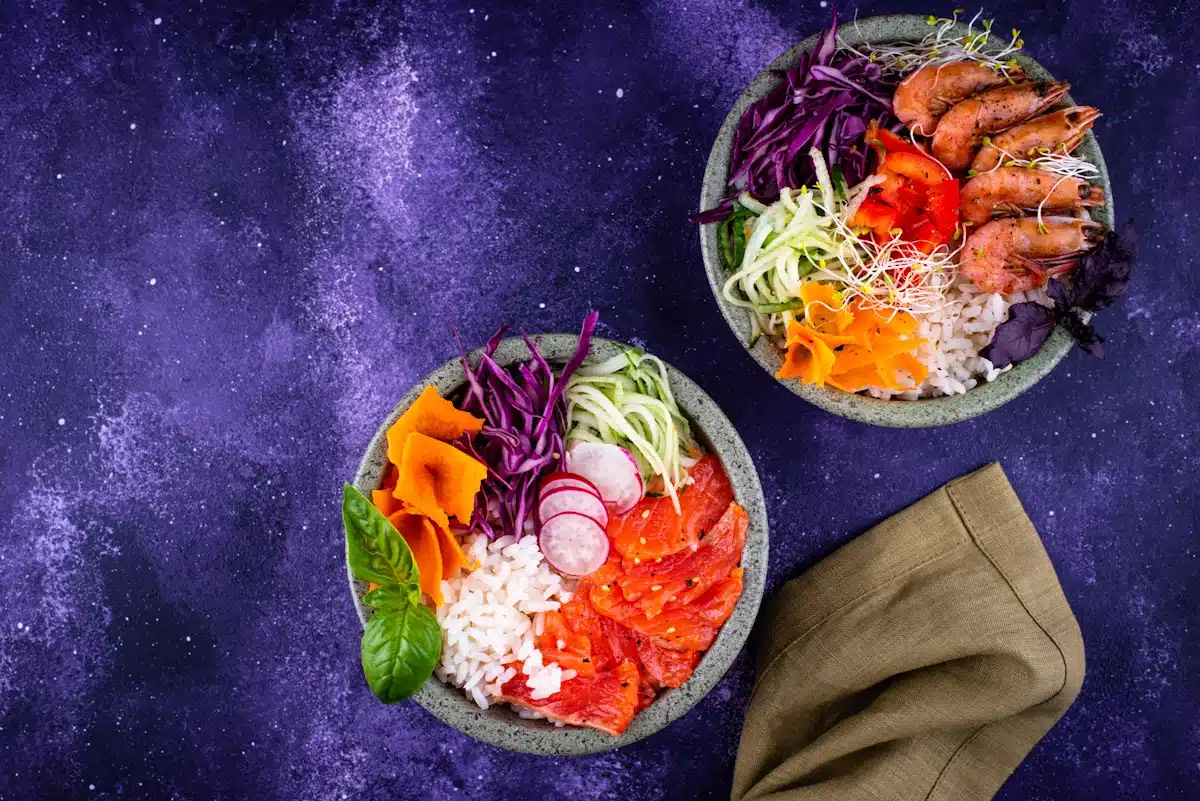You might think your lunch choices are personal preferences, but they reflect your generation! You’re all part of a lunch timeline, from your grandma’s comfort food to your kid’s weird snacks. We’ve got the scoop on these generational lunch ideas and will explore and celebrate the differences!
Baby Boomers: Generational Takeaways
Traditional and nostalgic recipes can be modernized while preserving cultural significance and ancestral roots.
Baby boomers can make healthy choices by focusing on whole foods, lean proteins, fruits, and veggies; everyone at the table will benefit.
Generation X likes fusion food favourites, mixing and matching bold flavours and cultural influences to create new combinations.
Millennials go for quick, easy, nutritious meals that align with health, convenience, and sustainability.
Each generation—whether Baby Boomers, Gen X, Millennials, or Gen Z—has been shaped by unique experiences, values, and cultural influences that define its worldview and behaviour. Understanding these age groups is crucial for fostering better communication from one generation to the next.
In this Article

Understanding Generations
In today’s society, where multiple generations coexist and interact, understanding these generational differences is more important than ever. Baby Boomers, for instance, witnessed the rise and fall of communist states, significantly influencing their worldview and values. Each generation—Baby Boomers, Gen X, Millennials, or Gen Z—has been shaped by unique experiences, values, and cultural influences that define their worldview and behaviour. For instance, Baby Boomers grew up during a time of significant social change, which has made them generally regarded as more traditional and value-driven. On the other hand, Millennials, who came of age during the rise of technology and social media, often prioritize convenience and sustainability.
Recognizing these differences helps us appreciate the diverse perspectives that each generation brings to the table. It also enables us to foster better communication and understanding in our interactions, whether at home, work, or in the community. By acknowledging the unique attributes of each generation, we can create a more inclusive and harmonious environment where everyone feels valued and understood.
Definition and Date Range
The Baby Boomer generation is generally regarded as those born between 1946 and 1964, marked by significant economic and social change in Western Europe and North America. This era saw the end of World War II and the beginning of a new age of prosperity and growth. Baby Boomers are known for their idealism and activism, having grown up during times of great social upheaval. Their desire for social change and justice has profoundly impacted their values and worldview, making them a reflective and forward-thinking generation.
Economic Prospects and Standards of Living
During their formative years, Baby Boomers enjoyed unprecedented economic prosperity. With rising standards of living, increased access to education, and better healthcare, they experienced a significant boost in consumer spending and the growth of the middle class. However, the 2008 financial crisis and the subsequent recession have impacted their economic prospects, leading to a declining standard of living. Despite these challenges, Baby Boomers have shown resilience and adaptability, continuing to navigate the economic landscape with determination.
Grandma’s Traditional Family Recipes
Using your grandparents’ traditional recipes can add a nostalgic twist to your family’s lunchtime menu. Whether from Latin America or other regions, these recipes are steeped in history and cultural significance. They are about food and cultural preservation. They tell the story of your roots, bringing alive the flavours and traditions of your ancestors.
But you’re not always in the mood for a heavy, old-fashioned meal. That’s where recipe modernization comes in. Imagine giving grandma’s hearty stew a modern makeover, keeping the love and warmth but making it lighter and more to your taste. How about a gluten-free version of Grandpa’s favourite Sunday pie? Sounds good?
Modernizing these recipes will not diminish their essence. It will add a modern twist and make them appeal to the young and the old. And while you’re at it, you’ll create a family tradition that respects the old while embracing the new.
Baby Boomer’s Healthy Choices for Older Adults
Building on the idea of modernizing traditional recipes, you can also incorporate the healthy eating habits of the Baby Boomer generation into your family’s lunch routine. You’ll find that ‘Boomer Nutrition Trends’ is all about whole foods, lean proteins and a rainbow of fruits and veggies. These are not just age-appropriate diets but lifestyle choices that will benefit everyone at the table.
It is also important to be mindful of potential allergic reactions when preparing meals, especially for those sensitivities to certain foods. Such a condition can be a persistent source of strain for older adults, making it crucial to choose ingredients carefully.
Here are three easy ways to adopt Baby Boomer’s healthy choices:
Whole Grains** Over Refined: Opt for bread and pasta made from whole grains.** They’re packed with fibre and essential nutrients and will keep you fuller for longer.
Lean Proteins: Choose lean meats like turkey or chicken or plant-based proteins like lentils and chickpeas. These will provide protein without unhealthy fats.
Colourful Fruits and Vegetables: Aim for a rainbow on your plate. Each colour represents a different set of nutrients, ensuring a balanced meal.

Fusion food such as this Hawaiian poke bowl with salmon and shrimp.
Gen X’s Fusion Food Favorites
Moving on from Baby Boomers’ healthy choices, let’s look at Gen X’s love for fusion food, a trend you can easily add to your family’s lunch menu. Gen Xers grew up between the mid-60s and early 80s during cultural shifts and globalization, greatly impacting their food preferences.
Cultural influences on Gen X’s cuisine are visible. They were the first generation to see food as a multicultural experience. Many fusion food trends originated in the United Kingdom during the 1960s and 1970s. This means they love Mexican enchiladas, which combine their bold, hearty flavours with the delicate, light taste of Japanese sushi—a fusion dish.
Globalization has a significant impact on fusion food. Gen Xers can access ingredients and cuisines worldwide thanks to trade and travel opportunities. They’re not afraid to mix and match, resulting in unique combinations like Thai tacos or Italian ramen.
Millennial’s Quick Fix
Moving on to the millennial generation’s eating habits, they opt for quick, easy meals that don’t sacrifice flavour or nutrition. With its diverse food scene, New York City has significantly influenced Millennial food trends. As a generation that’s all about hustle, millennials need food options that can keep up with their fast-paced lives without compromising their health-conscious mindset.
Here are three millennial lunch ideas that are quick, easy, and nutrition-packed:
Avocado Toast: Avocado is a millennial trend, and this quick lunch idea is a favourite. It’s simple, nutritious and customizable. Top with eggs, tomatoes or whatever you like.
Quinoa Salad: Quinoa salad is a refreshing option high in protein and fibre. Add your favourite veggies, a protein source, and a dressing—voila!
Meal-prepped Bowls: Meal-prepping is a millennial’s best friend. It’s efficient and reduces waste. Think Buddha bowls, burrito bowls, or poke bowls, prepared in advance for grab-and-go convenience.
These meals are more than just food. They represent the millennial generation’s health, convenience, and sustainability values.

Some Gen Z friends are having lunch together
Kid’s Lunch Ideas for Gen Z Age Groups
Moving on from millennials’ lunch preferences, let’s look at the menu for Gen Z kids. This generation is not afraid to think outside the box regarding food, drawing inspiration from regions like South America. Social media greatly impacts their meal choices. Thanks to Instagram and TikTok, Gen Z is digital and a foodie.
One of the biggest food trends among Gen Z is veganism. You’ve probably noticed Gen Z’s vegan trends are all about fusion and creativity. Think vegan sushi rolls with avocado and sweet potato or a colourful Buddha bowl with fresh veggies, quinoa and a tangy tahini dressing. They’re not just doing this for the ‘gram; they’re genuinely concerned about their health and the environment.
Cultural Influences
Cultural influences profoundly impact the values and behaviours of different generations. For example, the Baby Boomer generation was significantly influenced by the social and cultural upheavals of the 1960s, including the civil rights movement, the Vietnam War, the counterculture revolution, and the economic conditions in Eastern Europe. These events fostered a sense of activism and a desire for social change, hallmarks of the Baby Boomer ethos.
In contrast, the Millennial generation has been shaped by the rapid advancement of technology and the rise of social media. Growing up with the internet, smartphones, and social networking platforms, Millennials have developed a strong affinity for digital communication and instant access to information. This has influenced their values, making them more open to diversity, innovation, and global connectivity.
Understanding these cultural influences allows us to better relate to individuals from different generations. It helps us see why certain values and behaviours are important to them and how their experiences have shaped their outlook on life. We can bridge generational gaps and foster more meaningful connections by appreciating these cultural contexts.
Family Dynamics
Family dynamics have evolved significantly over the years, influencing the values and behaviours of different generations. The traditional family structure—comprising two parents and their children—was the norm in the past. This setup often emphasized stability, clear roles, and a strong sense of duty and responsibility.
However, today’s families are more diverse, with single-parent households, blended families, and multi-generational living arrangements becoming increasingly common. These changes reflect broader societal shifts and profoundly impact how different generations interact and relate to one another. For example, children in single-parent households may develop a greater sense of independence and resilience. At the same time, those in blended families might learn to navigate complex family relationships from an early age.
Understanding these changes in family dynamics is crucial for supporting and communicating with individuals from different generations. It helps us recognize each family arrangement’s unique challenges and strengths, allowing us to offer more empathetic and effective support.
Communication and Relationships
Effective communication is the cornerstone of building strong relationships between different generations. Each generation has its preferred communication styles and methods, shaped by their unique experiences and technological advancements. For instance, Baby Boomers might prefer face-to-face conversations or phone calls, valuing the personal touch and direct interaction. In contrast, Millennials and Gen Z are more comfortable with digital communication, such as texting, social media, and video calls.
To build stronger connections with family members, colleagues, and friends from different generations, it’s essential to understand and respect these communication preferences. Here are a few tips to improve inter-generational communication:
Be Open and Flexible: Adapt your communication style to suit the preferences of the person you’re interacting with. This shows respect and willingness to connect on their terms.
Listen Actively: Pay attention to what the other person is saying without interrupting. Active listening fosters mutual understanding and respect.
Use Clear and Simple Language: Avoid jargon or slang unfamiliar to other generations. Clear and straightforward communication helps prevent misunderstandings.
By embracing these strategies, we can enhance our relationships with individuals from different generations, creating a more inclusive and supportive environment for everyone.
Travel and Exploration
Known for their adventurous spirit, Baby Boomers have always loved travel and exploration. The rise of air travel and package tours allowed them to explore new destinations, contributing to the growth of the tourism industry. This generation’s travels have fostered a greater awareness of different cultures and ways of life. However, the COVID-19 pandemic has significantly impacted their travel habits, leading to a decline in international travel. Despite this, Baby Boomers seek new experiences through local travel or virtual exploration.
Generational Milestones and Events
The Baby Boomer generation has witnessed and participated in many significant events and milestones shaping their lives and values. These events have left an indelible mark on their worldview, from the civil rights movement and the Vietnam War to the fall of the Berlin Wall. These experiences have fostered a sense of activism and a desire for social change, which continue to influence their actions and beliefs today.
Work and Retirement
Baby Boomers are known for their strong work ethic and career dedication. As they reach retirement age, many face challenges related to pension provision and healthcare. This has led to many older adults continuing to work beyond traditional retirement age, either out of necessity or wanting to stay active and engaged. This trend highlights the Baby Boomers’ resilience and adaptability as they navigate the complexities of modern retirement.
Leisure and Entertainment
The Baby Boomers deeply appreciate music, film, and television, with many iconic artists and shows emerging during their youth. This generation’s love for entertainment has contributed to the growth of the industry and a greater awareness of different genres and styles. However, the rise of digital technology has transformed their leisure habits, leading to a decline in traditional forms of entertainment. Despite this, Baby Boomers enjoy a rich and diverse array of cultural experiences, adapting to new technologies while cherishing the classics.
By understanding the unique characteristics and experiences of the Baby Boomer generation, we can better appreciate their contributions to society and foster more meaningful connections across generations.
Inter-Generational Conclusion for Multiple Generations
In every generation, food tells a story. Grandparents’ traditional recipes reflect their cultural roots, Baby Boomers’ healthy choices are a shift towards wellness, and Gen X’s fusion food faves are a world becoming more global. Millennials’ quick and easy meals are a fast-paced lifestyle. And let’s not forget Gen Z, with their kid’s lunch ideas, redefining what a lunchbox looks like. Every generation is a new chapter in the food story, each adding a new flavour to the family banquet.

